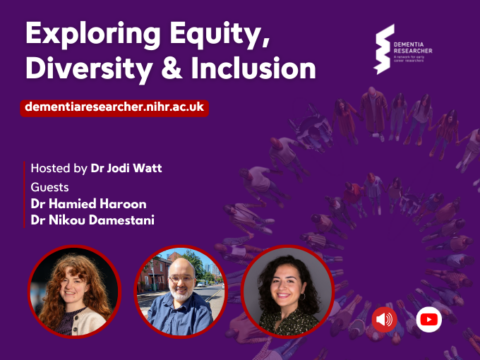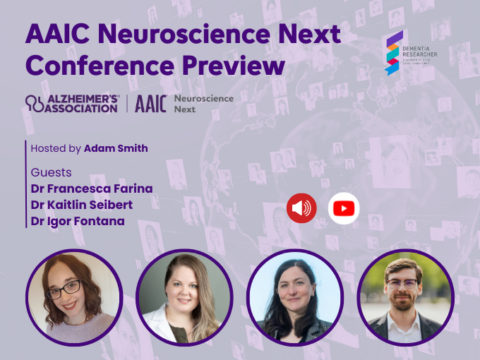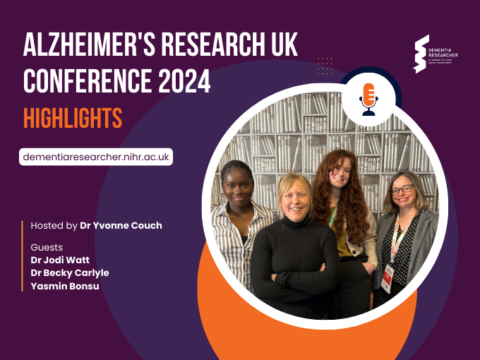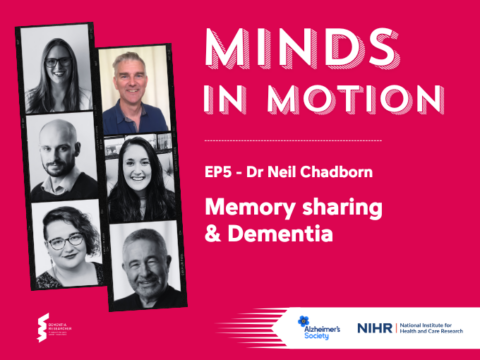Welcome to our Christmas Special End of Year Roundup – from the crammed Dementia Researcher archive, here are some of the best bits in a 2018 compilation, featuring choice nuggets from this year.
Megan O’Hare:
Welcome to this Dementia Researcher Podcast, brought to you by dementiaresearcher.nihr.ac.uk, a network for early career researchers.
Megan O’Hare:
Hello, my name is Megan O’Hare and welcome to our podcast recording for the NIHR Dementia Researcher website.
Amy Monahan:
Hello, my name is Amy Monahan and welcome to the first podcast recording for the NIHR Dementia Research website.
Chris Hardy:
Hello, my name is Chris Hardy and welcome to our podcast recording for the NIHR Dementia Researcher website.
Lakshini Mendis:
Hello, my name is Lakshmi Mendez and welcome to our podcast recording for the NIHR Dementia Researcher website.
Oz Ismail:
Hello, my name is Oz Ismail, and today I’m hosting this podcast recording for the NIHR Dementia Researcher website.
Francesca Lafrenay:
Hello, my name is Francesca Lafrenay and welcome to our podcast recording for the NIHR Dementia Researcher website.
Jo Barnes:
Hello, my name is Jean Barnes and welcome to our podcast for the NIHR Dementia Researcher website.
Charlotte Stoner:
Hello, my name is Charlotte Stoner and welcome to our podcast recording for the NIHR Dementia Researcher website.
Adam Smith:
Hello, my name is Adam Smith. I’d like to welcome you to this special on location podcast recording for the NIHR Dementia Researcher website. Special because the fantastic [inaudible 00:01:17] medical school is playing host to us today, but on location from the Alzheimer’s Association international conference in Chicago.
Speaker 10:
I think something that you all you also have in other countries but particularly in the UK is very strong when I go to various meetings that I have across Europe and even in South America, and Asia we have a lot of public involvement, and I think that especially in dementia is very strong. So it’s getting stronger and stronger, the idea that we have to listen to the voices of people with dementia because I do psychosocial research and that’s really important and listening to family members.
Speaker 10:
And so, the input that these people have on our decision making in research is very, very strong. And I learned a lot through that. And when I go, I work still with people in Brazil and when I see the kind of activities that they have, it just strikes me that that is not there, and people are not being involved from the beginning, from the design of the study and I’m being able now to take it there. So that’s really, really nice.
Speaker 11:
Are there any specific advantages that you think involving people at that really early stage confers?
Speaker 10:
Well, they are the people living with disease, so they are the experts.
Speaker 12:
Actually we had residency in the science museum in London where we got about 700 people through and we were looking at lots of different tests of eye tracking, so for instance, memory tests, we were showing people pairs of pictures and in the start of the eye-tracking experiment, there’d be two pictures and then in the end, there’d be another two pictures, but one of them they would have seen before and we were trying to see whether people spent more time focusing on the image that they hadn’t seen. So it was almost like a memory test out to see if they could remember that they’d seen it. There were other things to do with reading, to see whether or not people had language deficits. So we put some nonsense words in the middle of sentences and looked at how… I’m realizing I’m whacking my finger here and that’s completely useless for podcasts.
Speaker 15:
So, there’s more research into what it’s like for women who are diagnosed and living with dementia. But in general there isn’t a lot really that looks at the differences between men and women. And what we’ve found is that there’s quite a lack of support available that appeals to men when they’re diagnosed with dementia. So sporting memories is one of the ways that we can tap into appealing to men and getting more men out of the house and socializing with other people and engaging with support.
Speaker 16:
Okay, so it was quite an active that you actually get people to come to you.
Speaker 15:
Yeah, the groups are based in a variety of different settings in the community. So, they can be hosted in sports centres, libraries and other community centres as well.
Speaker 17:
I was trying to encourage a lady to sit up at the table for lunch, but she had dementia and she kept telling me it wasn’t lunch time, she didn’t believe me. And on top of that she had paranoia as well. And as a staff member, she just didn’t believe me that it was lunchtime until she saw other people sitting at the table eating their lunch and she said, Oh okay. And then she went up and then she ate her lunch really well. So that’s where the needs of the past and fitted with the occupation itself and the environment allowed for it by having that space for them. So yeah, I think the systems that is person centered and the making mealtimes meaningful would be my key outcomes.
Speaker 18:
When Chris had his diagnosis, the whole family received a diagnosis. We all had to change our way of living. We didn’t change our life, but just our way of living to make certain adjustments for Chris and certain adjustments in making sure was somebody always available if needed. But I think Chris and Hillary were diagnosed at an optimum time because we’ve had great inroads with the internet. As Chris said, there’ve been lots of people before and as Hillary said, saying the same things that they’re saying, but now with the internet, people have had a much louder voice. People have been able to get together and people like the researchers have been able to find the advocates like Chris and Hillary much more easily because of the internet and email and all the social media.
Speaker 18:
People that are very, very passionate may seem to have a louder voice. It’s just that they may be able to use the internet or social media more easily or find out how to get involved. We didn’t know about Alzheimer’s Research UK until we went onto the internet and that has enabled people with dementia to actually have a much stronger voice. Prior to this, it was very much the carer’s voice that was heard and our perception of what Chris may have wanted or may have needed as opposed to now, which their own voice is being heard and being heard very strongly and worldwide.
Speaker 19:
We’re all guilty of using red and green as our sort of two primary staining colours. But just changing red to magenta just makes a huge difference for people who are colour blind. So, we kind of forget that when you were saying, and obviously this is a different stain to that one, and actually it looks entirely the same colour to someone. So just that five minutes changing it on ImageJ and you can make it much more accessible to someone else.
Speaker 20:
I’ve never thought about that.
Speaker 21:
And I think the same rules apply to, we all know those PowerPoint presentations where they have a blue background and yellow text and it hurts your eyeballs. Like don’t do that to your poster either.
Speaker 19:
Or blue and red.
Speaker 22:
At the moment, I’m involved multiple ways. I would say one word fits all in the sense of coordinating this international network. It’s a network made of 45 research groups all over the world. It includes North America, both US and Canada. It includes basically the UK and the entire continental Europe, and it also extends to Australia. And the major focus at the moment has been collecting and generating genetic data for a vast amount of samples that we’ve collected thanks to this network. So we basically now have up to 6,000 independent samples for which we have generated data. So it’s probably the largest to date data set on sporadic frontotemporal dementia.
Speaker 23:
What about you?
Speaker 24:
I thought I walked in accidentally to a fitness conference. Yes, you did just say my name wrong. Yeah, I thought I walked into a fitness conference or that we were going to be doing like aerobics, and I was like, I’ve got a sprained knee. I can’t get involved in this. But yeah, it was definitely very interesting. It has not helped me sell the fact that I’m not on holidays to my family who now firmly believes that I’m not doing any work at this moment.
Speaker 25:
Being the first time at this meeting, I think it’s really exciting to see research from a different angle because before I’ve been to MRI conferences, but coming here to the Alzheimer’s Association, it’s really nice to see that there’s so many angles that you can actually approach this topic from. The quote I heard today was “Everything touches everything.”
Speaker 25:
I was like, “Oh okay.” I thought it was really interesting the link between the microbiome and the brain and so there’s been lots of research which shows that there’s a co-morbidity between gastrointestine disorders and the central nervous system. And I thought because I’m looking at how water passes into the brain, here they were talking about how the microbiota can pass through the cell walls, and the toxicity that there is here, and how changes in the microbiota, you can see correlations in disease. So they were looking both at Parkinson’s disease and Alzheimer’s disease. So I suppose it’s really important what goes in our body, and how that affects our brain as well.
Speaker 26:
It’s unfortunate. I think that speech language therapy is full of terms which need a lot of explanation. It’s a real shame, but not many people even know what aphasia is. So let’s take one bit at a time. Aphasia is an acquired language problem. The problem that’s caused by damage to the language processing parts of the brain. And it can result in difficulties with understanding language, which includes reading, understanding what you read, understanding what you hear and encoding what you want to say. So you’ll have an idea in your head, but you can’t put it into words and sentences necessarily.
Speaker 26:
And aphasia is probably most commonly caused by stroke, but we’re here to talk about a progressive type of aphasia, which is a form of dementia, frontal, temporal lobe dementia. So in this condition, the parts of the brain which are involved in processing language are affected by abnormal proteins being deposited in that area. And so the result is a progressive language loss over time. And the reason it’s called primary progressive aphasia is that the language is leading the dementia. People often think of dementia as being memory problems and there are obviously types of dementia which fit into that kind of pattern, but this is a language led dementia.
Speaker 27:
I was working in Autism and I was really interested in how the brain processes social function. I was working in that in a sort of normal sense. How does the brain normally remember people and recall people and how does neurons process social information. I was working in Autism genetic mouse models.
Speaker 27:
However, an opportunity came up to start to look at this in terms of Alzheimer’s disease and when I started formulating these ideas there really wasn’t a huge amount surrounding dementia and social withdrawal, but it was noted. There was a few studies that basically showed that the broader your social networks, that’s the more people you regularly communicate with go out with the et cetera, that can actually protect you from cognitive loss despite your pathology getting worse. And I was really interested in that, so why? What is this about social that’s important? That actually is somewhat protective?
Speaker 27:
Now since I’ve started the fellowship, more stuff like that’s come out. So the Lancet Commission that showed that social isolation is a risk factor for dementia. There’s more and more coming out that suggests that social factors are an important part of dementia, could even cause dementia. I mean that’s a very small proportion compared to other risk factors, but it is now a Bonafede risk factor.
Speaker 27:
So that’s where I was able to transition what I was doing. And really very few people are trying to understand the mechanisms. There’s a lot on sort of social psychology sides, on showing that social isolation, et cetera is a risk. But very few trying to understand where in the brain that was being manifested, the neural mechanisms, et cetera. So this is where we’ve been using mouse models to try and explore this a little bit more.
Speaker 27:
And so partly the work I do with [inaudible 00:13:48] is taking a whole brain approach to see which brain regions, particularly within the social brain, so those regions that process social information, which ones may show more pathology or degrade earlier than others? And with Steve looking at how neurons function, so looking at different parts of the social brain, which we’ve now done and seeing if there’s differences. So one brain region is affected versus one that’s not affected to give us some insights of maybe this brain region is more important early on in social draw than another. And it gives us ways of targeting maybe therapeutically, but by a variety of means, we can actually try and improve social function if we understand it better.
Speaker 28:
And I remember from my own PhD doing this field research, doing a few hours in the care setting, coming back and feeling exhausted, just really, really tired and needing to kind of figure out a whole way of working around that. And I think it kind of ties into what the others are saying in terms of a broader acknowledgement of mental health and different needs and creating kind of flexible workplaces. I don’t know what the answer is. I do know that we can talk a bit more about it.
Chris Roberts:
Hello, I’m Chris Roberts. I live in North Wales right on the coast. Lovely, beautiful spot. I was diagnosed about six years ago, maybe seven, firstly with Vascular Dementia and then a little bit afterwards, three months afterwards, I think with Alzheimer’s. So I’ve got mixed dementia.
Chris Roberts:
It was a bit of a learning curve because we were totally ignorant about dementia, so it took us a while. But after research we understood the illness a bit better and we could embrace it a bit better. And with any life changing illness, we changed our lives, and that’s what we’d be doing now. We’re involved in, same with Hillary, lots of similar things. And research actually gave us the hope that we were looking for, because there was no cure. We thought it was the end of the world, and research gave us the hope we’re looking for. It does give people hope and it’s fantastic to take part.
Megan O’Hare:
This was a podcast brought to you by Dementia Researcher. Everything you need in one place. Register today at dementiaresearcher.NIHR.ac.uk.
END
Like what you hear? Please review, like, and share our podcast – and don’t forget to subscribe to ensure you never miss an episode.
If you would like to share your own experiences or discuss your research in a blog or on a podcast, drop us a line to adam.smith@nihr.ac.uk or find us on twitter @dem_researcher
You can find our podcast on iTunes, SoundCloud and Spotify (and most podcast apps).

 Print This Post
Print This Post




